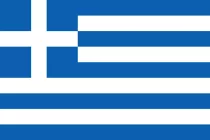Greece

Geographical Location of Greece
Greece consists of the southernmost part of the Balkan Peninsula and its surrounding maritime zone, rich in islands. The country has more than 2,500 islands, of which 227 are inhabited. The mainland and islands are characterized by mountains and rugged and steep coastlines. Almost half the country consists of barren mountains with shrubs and grass. A quarter of the land is arable land, and a fifth is forest. The country's highest mountain, Olympos, is located at an altitude of 2917 meters above sea level. The country has a typical Mediterranean climate with mild and rainy winters and hot, dry summers.
Due to the hot climate, the country is very susceptible to droughts, forest fires and soil erosion. Earthquakes occur regularly. The biggest environmental problems are water and air pollution due to human activities.
Brief History of Greece
The area that is Greece today has been inhabited by people for many thousands of years. The first agricultural society in Greece arose around 7000 BC. The history of Greek-speaking peoples can be traced back to about 1600 BC.
Period from 800 to 350 BC known as Greek antiquity and is often revered as the cradle of European culture. Due to the rugged nature and many islands, small independent city-states arose. Together, the city-states developed the culture, politics, philosophy, and scientific innovations that formed the basis of most European societies and cultures. Democracy as a form of government originated more than 400 BC in Greece. The term comes from the Greek word "demokratia", which means "government by the people".
After countless years of war between city-states, the Greek lands found themselves under the rule of a series of larger empires. These include Macedonia, the Roman Empire, the Byzantine Empire and the Ottoman Empire. In 1830 Greece was recognized as an independent state. World War II was followed by a bloody civil war that lasted from 1946 to 1949. A military dictatorship was established in 1967, but it collapsed in 1974. That same year, democracy was introduced and monarchy was abolished. Greece has been a member of NATO since 1951 and the EU since 1981.
Society and Politics of Greece
Greece is a parliamentary republic where the prime minister heads the government and the president is the head of state. The president is elected by parliament and serves a largely ceremonial role. The country is governed democratically and freedom of expression is respected. However, government corruption is a widespread problem.
Since the 2008 global financial crisis, Greek politics has been characterized by severe social, political and economic unrest. The way politicians handled the crisis led to great distrust in the authorities. Before the crisis years, Greece had a well-developed social security system. Since the crisis, social benefits have come under great pressure. Unemployment is very high and pension payments have been significantly reduced. The austerity policies that the EU has ordered the country to implement have also led to significant opposition to the union.
Since the 2015 refugee crisis, Greece has been at the center of an influx of refugees. This was not easy for the country’s already weakened state apparatus. Both the Greek population and refugees suffered under difficult circumstances. Relations with neighboring Turkey are tense due to the conflict in Cyprus and disagreements over borders in the Aegean Sea.
Economy and Trade of Greece
In 2001, Greece entered into European cooperation. Three years later, it became known that the country had not met the financial requirements for membership. In December 2009, it became clear that the country had also accumulated a large budget deficit and a huge public debt. This led the country into a historic economic crisis that tested all cooperation within the eurozone. The country was forced to receive large bailout loans from the EU in exchange for meeting a number of financial conditions, such as savings and government reforms. The country's economy is currently growing, but it is expected to take several decades before it fully recovers from the crisis years.
The service sector is the most important sector of the Greek economy, accounting for about 80 percent of the country's gross domestic product. Tourism is especially important to the country, and they are among the most visited countries in the world. Other important industries are manufacturing and agriculture. Greece's most important exports are textiles, fruits and vegetables, petroleum products, wine and tobacco. The country has a trade deficit because imports of crude oil and petroleum products are very high.
Greek Cuisine and Culinary Traditions of Greece
Greek cuisine is one of the leading national cuisines of the Mediterranean. The climate and proximity to the sea have made Greek cuisine, along with Italian and other Mediterranean cuisines, one of the most varied and healthy in the world. https://kashevar.com/en/recipes/greece Greek cuisine includes many traditional recipes, which include both fish and seafood caught in the Mediterranean Sea and a huge range of fruits and vegetables grown in Greece. For example, almost no Greek dish is complete without the use of lemons. Another traditional ingredient in Greek dishes is Feta cheese, it is used in many different Greek recipes - from baked goods to salads, a classic example being Greek salad. Greek cuisine is not as widespread in the world as, for example, French or Italian cuisine, but its dishes still occupy a worthy place in world cuisine.







